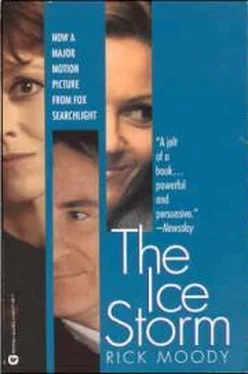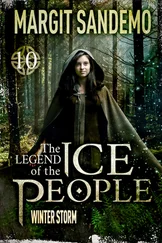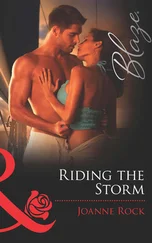Elena seemed to recognize something about him right away, he had thought, and it was something she didn’t like. This would give her some work to do. What Hood was concealing — remorse, canker sores, lack of athletic prowess — was apparent to Elena. Maybe she had heard about it from Diana.
The complex rituals of civilization fell away from him and he was immediately uncovered for her care. He couldn’t hide it. He had changed elementary schools once too often. He had fallen from a railroad bridge, into a swift river, while being carried by his father. Almost drowned.
His parents had rancorously parted. He told her all this. He couldn’t remember which story he had used. He couldn’t remember much in the way of specifics except a dim, smoky room, the warmth of tweed, the excess of that drummer, the swift tempo of a new attachment.
— You should read ——, was what Elena first said to him. Some mystic. Emanuel Swedenborg. Or Mme Blavatsky. She said it smilingly, flirtatiously, the way other people winked and said nice tie. He hated her for it; he hated that he didn’t recognize the name. Had she been a guy. Hood would have spit his rye in her face. Nevertheless, he was deep in conversation, drunkenly rambling. Talking about that railroad bridge again. He was uncomfortable with her and that seemed to be a part of things from the beginning.
Fraternity brothers happened by, eased in and out of the conversation. Dances came and went. Long clarinet solos. The drummer had them all applauding. That drummer scattered himself around the kit as though the story of that evening, the story of that party, were his responsibility. As though he had to be sure to pass through ever percussive mood, every tonal color, before the evening could pass away. It was a race against time signatures. Anything could happen in the world. Hood was telling his future wife. Profit and loss. Communism and capitalism. It didn’t make a bit of difference. He could be accepted at the training program at Chase Manhattan or First Boston or he could not. The notches in a whaling harpoon, the destruction of northeasters, the tedium of duck blinds — he couldn’t decide which opinion to give first. All that counted was a flashy car, a girl who would wear slacks and wasn’t afraid to smoke.
Elena didn’t say anything. She was as easy to read as some German theological tract. But she didn’t chide him either. She didn’t mention his weight and she didn’t muss his hair. It broke his heart in the end how she just kept listening and listening and he kept saying things he didn’t want to say.
In this way, Hood figured out that love was close to indebtedness. In settling this debt, he married Elena O’Malley. Family was a bad idea he got because there were no other ideas in those days. It was the outer margin of one little universe and nobody knew what lay beyond it. There were years full of evenings when the habit of marriage astonished him, when its repetition comforted him like nothing else ever had. Then this period came to an end. He had two kids, a house and a lawn mower, a Pontiac station wagon with simulated wood paneling on the side, a new Firebird, and a Labrador retriever named Daisy Chain.
He loved his wife and children, and he hated all evidence of them. The noise of children, and the terrible quiet just after, which augured-always, every single day- some broken heirloom or injury: it squeezed the life out of him a little bit at a time. His worry was ceaseless. His son, Paul, had picked his little nose and grabbed at his crotch in public. His daughter had exposed herself to a boy at the country club. Almost any life was feasible at his salary, but this was the one he had. It was seventeen years since he had met his wife, and in seventeen more years it would be 1990 and his son would be thirty-three and he would be fifty-six. Until recently he had believed that the elderly were born that way, unlucky. Now he knew how effortless that transformation was. His son would be there to remind him. In 1996, Paul would be his present age, thirty-nine, while he would be sixty-two, his mother’s age at the time of her death. His wife would be sixty, and she would be remarkably skeletal. Her church attendance would be regular.
— Janey!
Hood draped his prim, salmon-colored button-down shirt around his shoulders. He pocketed an escaped collar stay. Whose? His? In one hand, the bottle, the other, the drink. His vodka. A mourning dove was complaining out in back of the house. A car passed on Valley Road. Hood was sad. He opened the door. At the top of the stair, he called her name. Janey had assured him that the house was empty, that Mikey and Sandy were over with friends for the night — committing acts of vandalism, probably, ringing doorbells and running — that Jim was in the city for a week. Still, Hood thought he heard voices.
He fled back into the guest room and sat in the uncomfortable wicker chair. He zippered his pants, pulled on his socks.
He married Elena and they had the kids in ’57 and ’59 and they traded up in houses and they traded up in cars. To afford the family car, the Corvair, in ’63, Hood had been forced to trade in the Jaguar he had driven in college. It was all economics now. Or maybe he overlooked the subtlety of feeling that hid beneath economics. Beneath math. He made $48,000 a year not including the annual bonus. Income from stock held by Elena, $3,600; income from his own bad investments, a little less. Savings account. Joint returns. Public school meal allowance. Power boat. Life insurance. (His father had sold insurance.)
He had wanted another sports car ever since. And the first blossoming of adultery took place along precisely this vine. It was as humdrum as it could have been. He actually picked her up at the office Christmas party. This woman. Not at the family office Christmas party, to which he had taken the kids when they were young, but the interoffice Christmas party.
There was a drunken urgency to the event, an atmosphere of fear and need. He felt he had to say shallow, boorish things to this girl. There was no surprise in the way he complimented her knockers and her tush. He descended into vulgarity the way a buzzard locks in on some morsel of decay. He gorged himself on his discomfort. He had spilled a glass of wine on himself while trying to dance to a rock-and-roll song, and the spill, on his white shirt, resembled a chest wound.
He fully intended to drive her back to her Village apartment and then to get on some wide avenue north. It was uppermost in his mind. Instead, though, he found himself in his pathetic Karmann-Ghia, chauffeuring her around the empty west side of Manhattan, past the prostitutes and strip joints, through the haunted industrial quarters of the city. He pulled over, in his station car, in the meat-packing district. In front of a loading dock. He began to tell her stories, fabricated stories, about some past full of good humor, full of fraternity pranks and sex with girls in fast cars. And then he simply put his face in her lap, right in the middle of her lap. His nose and cheeks abraded on her wool skirt. He began to tongue the spot on her skirt where he imagined his disgrace might concentrate itself.
— Ben, she said. Take pity on me. I can’t even see straight. Come on.
He wouldn’t talk to her though. He was pulling off the lingerie under her skirt. She was still sweating from the dancing and he could smell it on her. She sighed. The lights of passing cars had a metronomic regularity. He maneuvered around the stick shift and the emergency brake to get his face between her legs. His pinstriped ass was up around the steering wheel. He was doing his best to feel bad. It didn’t matter that she had not bathed that morning; they had an arrangement now. Soon she was holding up her end. She was grunting softly, almost protestingly. He’d never heard such a thing before. Sounded like a swallow trapped by a barn cat.
Читать дальше












